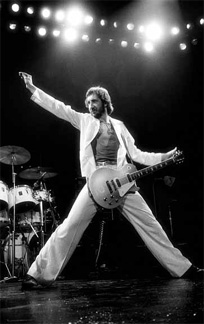Billy Corgan on Pete Townshend: “Suffering No Fools”
The Who appear on the current cover of Relix in a feature that includes an interview with Pete Townshend as well as many musicians’ memories of the group. Earlier in the month we presented Widespread Panic bassist Dave Schools’ thoughts on John Enwistle. Here is what Smashing Pumpkins foundr Billy Corgan has to say about Townshend and The Who.

Photo by Neal Preston
I remember when I was little, listening to a 7" of “Pinball Wizard” my cousin had and loving the guitar. The thing that sticks out in my mind about the first time I heard “Pinball Wizard” was how different it sounded than all the other bands at the time. It was powerful but it wasn’t like what you were used to hearing. Even now, The Who’s music strikes me as distinctive. The language and the way they play together are so unique.
My relationship with The Who, in a personal way – where the music meant something to me personally – took time. I never had that personal connection until I was about 18, when I got Meaty Beaty Big and Bouncy.
If you listen to Pete Townshend’s songs without the band – lately, I’ve been listening to the Quadrophenia demos – the music is not as rugged or aggressive. There’s something about Pete’s introspective songwriting meeting the street thuggery of the band that, to a young a man, you identify with its fighting spirit.
It’s an existential identification as opposed to say the punk ethos of the Sex Pistols. The Sex Pistols, to me, sounded like fighting music. The Who sounded like “I’m trapped in something and I’m not really sure what to do but I’m going to kick my way out of here” kind of music. It had a different emotional resonance to it: the lyrics, the feelings and even the different periods of the band.
Even in their poppy, ‘60s incarnation, The Who weren’t cuddly. There was a smirking, snotty punk thing. To an accommodating class – rock and roll has become about accommodation more than anything else – the message is too complex; the history is too non-linear.
I’ve often said that, in many ways, The Who was probably the closest blueprint to my band, The Smashing Pumpkins, as far as an introspective singer/songwriter finds aggressive, ever-melting-down rock vehicle to perpetrate his wares. I identified with The Who even more so when I was in the Pumpkins in the ‘90s [with the original lineup] because I felt like I understood what Pete was expressing interpersonally about what he was going through as a person and his experience in a band that couldn’t be controlled.
With The Who, it was a collective consciousness as much as my original band was a collective consciousness in and of itself. Much like Zeppelin, Keith Moon’s untimely death ruptured that collective consciousness in a way that it couldn’t necessarily continue in a consistent idiom. Even though they’ve been able to go out and mount tours and have been successful – and I’ve seen them myself – without all those pieces in tact and without that collective message continuing, sometimes it’s hard to translate the depth and the meaning of the depth in future generations that just want cuddly hits.
Even The Who’s anthem “Won’t Get Fooled Again” or “Baba O’Riley,” do most of the people listening to those songs even know what it means? Do they have any real emotional connection to the depth of the music? I would say, no, they just like the music and the riff – and that’s fine.
What’s funny about The Who is that when they decided to make pop, they were quite successful and showed themselves to be quite an ace pop band. It wasn’t like they just had the one gear – they had any gear they wanted.
Pete’s a real fighter and he went in there at different times and came out with stuff – stuff that endures. Stuff that has a depth to it that’s more akin to a European art film that just a trite piece of pop pabulum.
When you’re in the room with a true artist who’s taken that journey and will suffer no fools – he’s invested in the process, invested in what it means to be an artist – you can’t help but walk away feeling like it’s not the romantic side of the path. It’s the real side of the path. It’s like when you meet a monk who’s meditated for years and years; there’s no bullshit in them. Pete’s reached a point in his life where there’s no bullshit in him.
What makes Pete a remarkable person is that he’s very, very human. He’s been through every version of it and he’s settled into human. And I mean that in the grandest form of the compliment. He’s a real person. I emailed him a note the other day because I read his autobiography and I got back this lovely, personal note that can only come from someone who’s quite human and quite real. The fact that he survived intact and shared his journey so wonderfully – for better and worse – that’s the mark of a true artist.



















